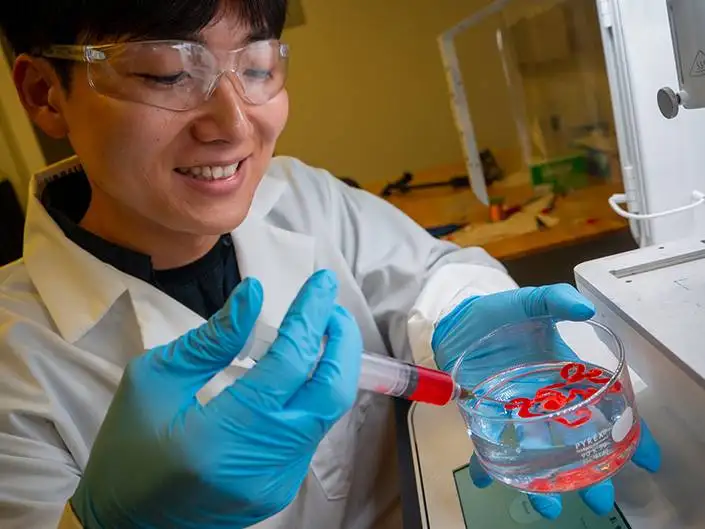Engineers at the University of California San Diego have developed a groundbreaking sustainable 3D printing method that utilizes a polymer ink and a saltwater solution to create solid structures, as published in Nature Communications. This innovative technique holds promise for making materials manufacturing more sustainable and environmentally friendly.
The process revolves around a liquid polymer solution known as poly(N-isopropylacrylamide), or PNIPAM. When this PNIPAM ink is extruded through a needle into a calcium chloride salt solution, it instantly solidifies upon contact with the saltwater. This rapid solidification is driven by the salting-out effect, where salt ions attract water molecules away from the polymer solution, causing the hydrophobic polymer chains in the PNIPAM ink to aggregate and form a solid structure.
Sustainable 3D Printing Process
“This process is carried out under ambient conditions, requiring no additional steps, specialized equipment, toxic chemicals, heat, or pressure,” explained Jinhye Bae, a professor in the Aiiso Yufeng Li Family Department of Chemical and Nano Engineering at the UC San Diego Jacobs School of Engineering.
Traditional polymer solidification methods are often energy-intensive and involve harsh chemicals. In contrast, this new method leverages the interaction between PNIPAM and saltwater at room temperature, achieving solidification without environmental harm. Furthermore, the process is reversible: the solid structures can be easily dissolved in fresh water, reverting to their liquid form, allowing the PNIPAM ink to be reused for further printing. “This offers a simple and environmentally friendly approach to recycling polymer materials,” Bae noted.
To demonstrate the versatility of their method, the researchers printed structures using PNIPAM inks mixed with other materials. For example, they printed an electrical circuit with PNIPAM and carbon nanotubes, which successfully powered a light bulb. This printed circuit could also be dissolved in fresh water, highlighting the potential for creating water-soluble and recyclable electronic components.
Bae and her team believe that this simple and reversible 3D printing technique could significantly advance environmentally friendly polymer manufacturing technologies.
The paper, titled “sustainable 3D Printing by reversible salting-out effects with aqueous salt solutions,” includes co-authors Donghwan Ji, Joseph Liu, Jiayu Zhao, Minghao Li, and Yumi Rho from UC San Diego, as well as Hwanshoo Shing and Tae Hee Han from Hanyang University, Korea. The research was supported by the National Science Foundation through the UC San Diego Materials Research Science and Engineering Center (MRSEC, grant DMR-2011924) and the Basic Science Research Program through the National Research Foundation of Korea funded by the Ministry of Education (grant RS-2023-00241263).
Disclosures: Jinhye Bae, Joseph Liu, and Donghwan Ji have filed a patent for this work through the UC San Diego Office of Innovation and Commercialization. The authors declare no competing interests.


